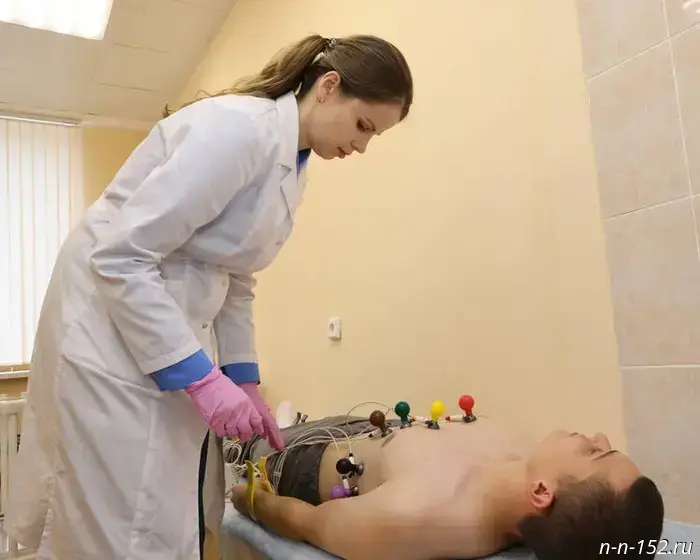
How to keep the body's main engine in good working order.
Compared with residents of Europe, Russian men live 11 years less and women 7 years less. And the reason for the shorter lifespan is cardiovascular disease. In recent years the situation has been improving, but it does no harm to remind people of the risk factors for cardiovascular disease and of preventive measures. This was told by the chief freelance specialist, cardiologist of the Ministry of Health of the Nizhny Novgorod Region, Elena Timoshchenko.
The main muscle.
- Elena Sergeyevna, why is so much attention paid to the treatment and prevention of cardiovascular disease?
- All organs in our body are necessary and important. The heart is the body's main muscle. It is a powerful pump that moves life-giving blood and lymph through the vessels, supplying oxygen and essential substances to other organs. The heart functions independently; it does not depend on the brain, which controls all the other internal organs and muscles. It is the most hardworking organ, whose work does not stop throughout life. The heart is the body's powerful motor that supplies other organs and muscles with oxygen and nutrients via the blood and lymph. That is why it is important to have a healthy heart.
- Who is in the risk group for heart disease?
- People mainly at risk are those with high arterial blood pressure, elevated blood sugar and cholesterol levels, and impaired kidney function. The likelihood of disease is also high in those whose close relatives suffered from heart and vascular diseases.
- When should one start taking care of heart health?
- Prevention of cardiovascular disease should begin in childhood. It is important for parents and teachers to talk about the harms of tobacco use, to promote healthy eating and physical activity among children and youth. Since the risk of cardiovascular disease increases with age, measures must be taken to reduce it. In addition to a healthy lifestyle, children and adults need regular medical supervision. Timely health screening makes it possible to identify and prevent diseases and to determine risk factors.
- What does the main prevention of cardiovascular disease consist of?
- There is an excellent non-drug method of prevention — changing one's motivation to preserve health. It is important to form a conscious attitude to nutrition, to regular physical activity, and to quitting smoking. The drug method is the careful use of medications in cases where the risk factors to which a person is exposed are poorly controlled by non-drug measures. Treatment will primarily help deal with high blood pressure, elevated cholesterol and blood sugar. If all risk factors are under control, one can say that the risk of heart attack and stroke has been minimized. To check and control the risk of developing cardiovascular disease, it is necessary to know: body mass index (the ratio of weight to height), blood pressure, blood sugar level and cholesterol level.
Salt — a source of trouble.
- Is nutrition an effective prevention of heart disease?
- Definitely. You should follow a healthy balanced menu, rich in fiber and low in fat. The diet should include fruits and vegetables. There should be at least 400 g per day. Be sure to control portion sizes.
From childhood it is important to eat properly. To reduce "bad" cholesterol, you need to normalize your diet, cut down on fatty meats, butter, sausages, fried potatoes, and avoid margarine and various spreads that contain trans fats. The right choices are lean white meat, vegetable oils, whole grains and legumes. Fatty fish (for example, salmon, trout) with its polyunsaturated fatty acids is beneficial in reasonable quantities. Nuts and especially apples are very good: just one apple a day helps keep cholesterol at a normal level. If for some reason you cannot monitor your diet, take a multivitamin complex that will compensate for the lack of vitamins and minerals in food and provide significant support for vessels and the heart.
Salt intake should be minimized. Excess sodium contributes to fluid retention in the body. As a result, the volume of circulating blood increases, which in turn creates a greater load on the heart. Sodium also increases vascular spasm, which significantly raises blood pressure. To fight excess weight, diets are not always enough. If you have tried to lose weight unsuccessfully more than once, pay attention to your lifestyle. Changing it will help control body weight, normalize metabolism and reduce the risk of diseases that are a consequence of excess weight. This will help you remain active for many years and ensure a happy future for yourself and your family. This is the main reason to pay attention to and take care of your body!
Walk for your health.
- What is the role of physical activity in the prevention of cardiovascular disease?
- Vessels and the heart need exercise. It increases blood and oxygen flow to brain cells, which ultimately leads to improved brain function and helps alleviate severe vascular headaches. Half an hour of physical activity daily, or at least 4–5 times a week. Remember that activity should be moderate!
The cardiovascular system developed in humans at a time when people were highly physically active — hunting, plowing, procuring food, building shelters, etc. Since then that kind of activity in people's lives has noticeably diminished, and for many it has disappeared altogether. To support the heart and vessels, they must be trained. You don't have to play sports or run — walking is enough, but preferably daily and for no less than 40 minutes a day. Carving out these 40–60 minutes can be difficult, but it is worth it!
- Everyone knows that bad habits are a risk factor for cardiovascular disease. If we care about our health, which of these habits should we eradicate first?
- It is very important to eliminate active and passive smoking, which does serious harm to the body. The fact is that endothelial dysfunction underlies cardiovascular pathology. The endothelium is the surface layer of cells that lines small and large vessels from the inside. Heart disease begins with damage to this layer. It has long been proven that smoking is the main enemy of the endothelium. So quit smoking as soon as possible!
- And finally, tell us how often one should visit a cardiologist and undergo examinations?
- Only a physician can competently assess the individual risk of a heart attack and stroke, propose solutions to identified problems, and set up a schedule of visits. Examinations can be conducted on an outpatient basis in a relatively short period of time. Cholesterol and glucose levels should be monitored once a year starting at age thirty-five. However, if family history is unfavorable, checks are recommended already from age twenty. Adults should closely monitor their blood pressure, because it largely determines the risk of developing cardiovascular disease.
Did you know?
World Heart Day was first organized in 1999 at the initiative of the World Heart Federation. This campaign was supported by the World Health Organization, UNESCO and other organizations. Initially, the Day was held on the last Sunday of September, and since 2011 it has had a fixed date — September 29.
NN Reference.
Cardiovascular diseases are a group of diseases of the heart and blood vessels, which include: hypertension, ischemic heart disease, cerebrovascular disease, peripheral artery disease, heart defects, cardiomyopathies, deep vein thrombosis of the lower extremities, pulmonary embolism and others. Important! A myocardial infarction or stroke can immediately manifest as disease without any preceding or worrisome conditions in the body.
Prepared by Alexandra Makhlina.
Другие Новости Нижнего (Н-Н-152)
 A girl almost lost her sight after an injury in the school locker room in Mukhtolovo.
Alexander Bastrykin has taken an interest in the situation. October 1, 2025. Vremya N. Nizhny Novgorod Region. Nizhny Novgorod.
A girl almost lost her sight after an injury in the school locker room in Mukhtolovo.
Alexander Bastrykin has taken an interest in the situation. October 1, 2025. Vremya N. Nizhny Novgorod Region. Nizhny Novgorod.
 Graffiti featuring portraits of great scientists adorned a street in the Kstovsky District.
Nizhny Novgorod News
Graffiti featuring portraits of great scientists adorned a street in the Kstovsky District.
Nizhny Novgorod News
 More than 250 events will be held in the Nizhny Novgorod region during the Decade of Older Persons.
Nizhny Novgorod News
More than 250 events will be held in the Nizhny Novgorod region during the Decade of Older Persons.
Nizhny Novgorod News
 T2 and "Solar" presented a cybersecurity solution for small and medium-sized businesses.
Nizhny Novgorod News
T2 and "Solar" presented a cybersecurity solution for small and medium-sized businesses.
Nizhny Novgorod News
 A hotline for questions about the autumn draft has been launched in Nizhny Novgorod.
Nizhny Novgorod News
A hotline for questions about the autumn draft has been launched in Nizhny Novgorod.
Nizhny Novgorod News
 Women in Nizhny Novgorod will be able to get a free mammogram in October.
Nizhny Novgorod News
Women in Nizhny Novgorod will be able to get a free mammogram in October.
Nizhny Novgorod News
How to keep the body's main engine in good working order.
Compared with residents of Europe, Russian men live 11 years less, and women live 7 years less. 01.10.2025. Nizhny Novgorod News. Nizhny Novgorod Oblast. Nizhny Novgorod.
